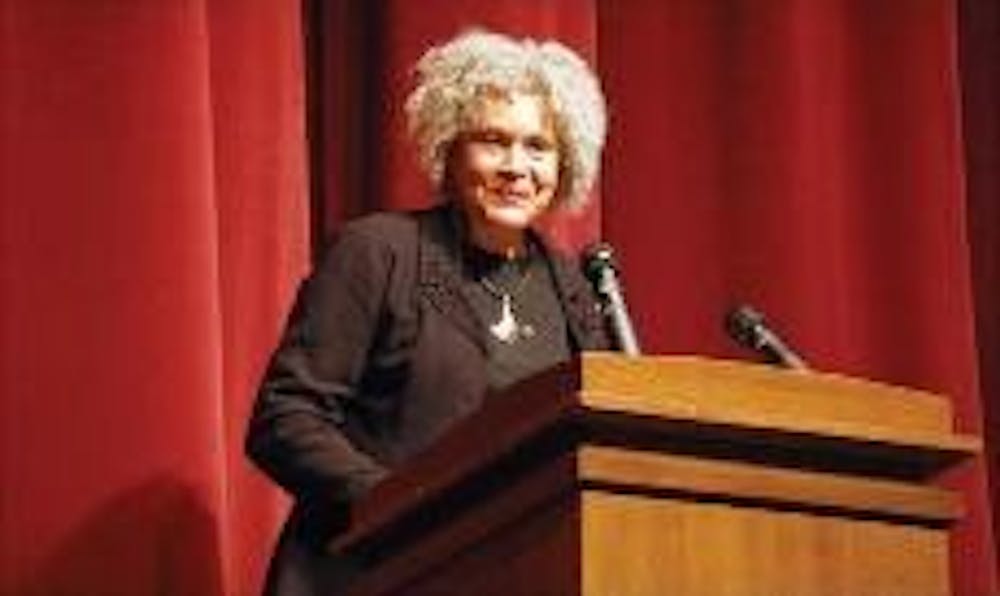
Journalist Charlayne Hunter-Gault speaks on African politics Monday evening at Hall Auditorium. She discussed the increasing stabilisation of the continent despite challenges.
Famed journalist Charlayne Hunter-Gault spoke to Miami University students and faculty Monday night about the political turmoil of Africa.
Hunter-Gault's lecture, titled after her new book, "New News Out of Africa," was held in Hall Auditorium. The lecture focused on the promise of a peaceful Africa.
In her lecture, Hunter-Gault said she believes that Africa is growing and developing into a more stable continent, despite the media's concentration on the war-torn and diseased areas.
By focusing on the message in her book, Hunter-Gault addressed the difficulty the world faces in merging people's perception of Africa and the actual reality of the nation. The book is a short history of recent events that have taken place in Africa and have affected its development.
"By 'new news,' I am not talking about news that has filtered through rose colored glasses," Hunter-Gault said. "By 'new news' I mean news that can be used by citizens in Africa and the rest of the world, that can help them make good and informed judgments about Africa and the people and their lives."
Hunter-Gault focused on the stability of nations such as South Africa, stating that they must remain as role models for other nations who are taking small steps toward the same stability. Other examples she mentioned were Nigeria's election of a female president and the Democratic Republic of Congo's treaty to end a nearly five-year-long civil war.
These small steps are examples of Africans' desire to stabilize politics throughout the continent, according to Hunter-Gault.
"It is not just about a gesture to help those who cannot help themselves, Africans are eager to take their destinies into their own hands," she said. "But they are also eager to accept partnership."
Hunter-Gault also spoke about the importance of Africa's success, particularly addressing the abundance of the continent's natural resources and global security.
"It is in the best interests of the United States for Africa to succeed," Hunter-Gault said. "Africa has 88 percent of the world's platinum, 40 percent of the gold, 73 percent of the diamonds, 60 percent of the manganese and equal cobalt. It is also a secure source of oil, and it is believed that by 2015, Africa will be providing one-fourth of the United States' oil needs."
Enjoy what you're reading?
Signup for our newsletter
While she focused on the positive aspects of the developing continent, she also mentioned the problems it still faces, including Darfur and the AIDS epidemic.
Hunter-Gault also spoke on the new movement to educate women and improve equality between the two sexes.
"After over a decade of reporting about change in Africa, I believe that if we can save (the) women of Africa, we can save Africa," she said. "The thing that we need to understand is that those goals that call for girls to be educated is a call to save the countries."
Hunter-Gault said that the education of women is extremely powerful because of the spillover effects it has on local communities and national politics.
"By educating a man, you educate an individual," Gault continued. "By educating a woman, you educate a nation."
Through the education of women and partnerships with western nations, Africa will become a major world force, Hunter-Gault said.
"We must get 'new news' out (to the) entire world, including Africa, so she can be treated as she is: again the mother of us all," Hunter-Gault said.
The lecture was open to the entire Miami community and was attended by students and faculty.
"I am fascinated by her life story and really wanted to know more about her," said sophomore Morgan Herlihy, a student attending the event.
Hunter-Gault's book, New News of Africa: What Africa Means to Me, was published in 2004. Hunter-Gault signed copies of her book after her lecture.
The lecture was sponsored by the Women's Studies Program, the Center for American and World Cultures, the John W. Altman Humanities Scholar-in-Residence Program and the Journalism Department.




